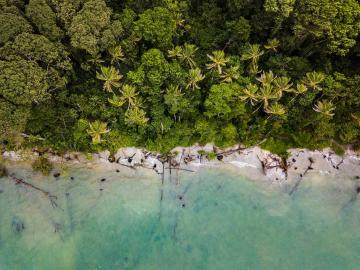TO

Environment Europe is delighted to announce the Costa Rica Winter School in Ecological Economics 2020 - an Ecological-Economic Inquiry into Costa Rica´s Sustainability Path - to be hosted by Fundación Neotrópica in Costa Rica, from 16-24 February 2020 focusing on Green Economy, Ecosystems, Smart and Sustainable Cities, Circular Economy and Sustainable Business Models.
Context
The United Nations selected Costa Rica as its 2019 Champions of the Earth award for policy leadership. Citing Costa Rica's plan to decarbonize its economy by 2050, the UN said that this Central American country "sets an example for the region and for the world." Inger Andersen, Executive Director of the United Nations Environment Program, stated,"Costa Rica has been a pioneer in the protection of peace and nature…Climate change demands urgent and transformative action from all of us."
This course will examine the path followed by Costa Rica, through a critical Ecological Economics, Environmental Policy and Human Geography lens since the 1980s and the benefits and challenges that its environmental reputation implies. This process will include critically analyzing the indicators suggesting a decoupling between GDP and deforestation, the appropriateness of Costa Rica´s institutional development, the policy measures taken in the process of seeking admission into the OECD and its environmental justice situation. A comparison of the realities between urban and rural remote areas where most National Parks are located will serve to understand the complexities of the relationship between human development and environmental conservation.
In view of the Costa Rican reality, the course will analyze the current thinking, both traditional and nontraditional, about the relationship between economic systems and environmental problems. It will draw on the expertise of a range of disciplines to place the country´s example within the global need to address current challenges, including tackling climate change, preventing the loss of biodiversity, and achieving sustainability.
A mix of theoretical and practice modules, will take participants from the reality of the Central Valley, where most opportunities and affluence are located to a one week field trip in the Costa Rican South Pacific´s Osa Peninsula, named by National Geographic as the most biologically intense place on Earth.
The course is designed for multiple points of entry and could be helpful for PhD students, government experts, representatives of international organisations and business. The course will give participants an opportunity to explore key methodologies for ecological-economic analysis and to apply these to various case studies.
Objectives
- Define, describe and analyze the general theoretical proposal of ecological economics to solve the problems related to sustainable development and natural resource management in view of Costa Rica´s example
- To provide an advanced understanding of the historic roots and development of Costa Rica´s environmental phenomenon and to understand the main environmental and sustainable development policies that substantiate its current performance and reputation
- To use the methodological tools of Ecological Economics and Human Geography to measure and solve practical situations (i.e. policy decisions, socio-ecological conflicts) in view of Costa Rica´s reality, including spatial analysis and the application of diverse languages of valuation: monetary, biophysical and qualitative/multicriterial
- To provide a multidisciplinary understanding of the main challenges that Costa Rica´s development proposal faces today, with special emphasis on its decarbonization policy
Background
The executive Oxford Summer, Winter and Spring Schools in Ecological Economics organised by Environment Europe since 2012 have attracted participants from 58 different countries on all continents, including UNDP, UNEP, IUCN, OECD, WWF, GGGI experts as well as representatives of ministries, companies, NGOs and leading universities.
